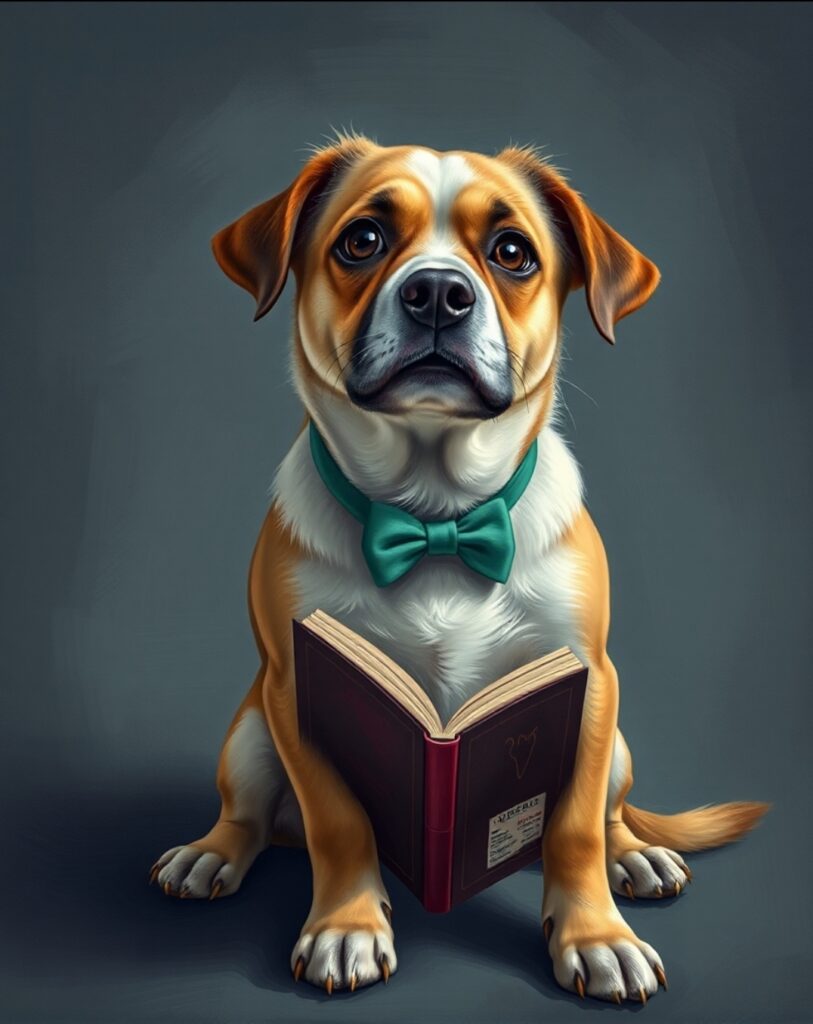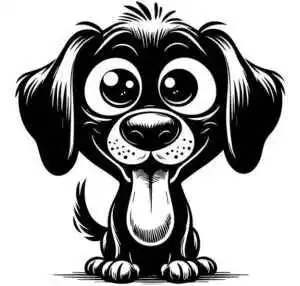99+ Discover the Best Literary Dog Names to Cherish
Struggling to find a unique name for your dog? Discover 99+ literary dog names that are inspired by timeless classic characters.

Literary Dogs Name
Austen – Inspired by Jane Austen, author of Pride and Prejudice.
Beowulf – The heroic figure from the epic poem Beowulf.
Darcy – After Mr. Darcy from Austen’s Pride and Prejudice.
Gatsby – Inspired by Jay Gatsby from F. Scott Fitzgerald’s The Great Gatsby.
Huck – From Mark Twain’s The Adventures of Huckleberry Finn.
Scout – The young narrator of Harper Lee’s To Kill a Mockingbird.
Holden – After Holden Caulfield from J.D. Salinger’s The Catcher in the Rye.
Hermione – The brilliant witch from J.K. Rowling’s Harry Potter series.
Atticus – Inspired by Atticus Finch in To Kill a Mockingbird.
Dante – After Dante Alighieri, author of The Divine Comedy.
Orwell – After George Orwell, known for 1984 and Animal Farm.
Poe – Inspired by Edgar Allan Poe, master of horror and mystery.
Moby – From Moby Dick, the great white whale in Herman Melville’s novel.
Clover – A character from George Orwell’s Animal Farm.
Frodo – The brave hobbit from J.R.R. Tolkien’s The Lord of the Rings.
Samwise – Frodo’s loyal companion in The Lord of the Rings.
Dorian – After Dorian Gray from Oscar Wilde’s The Picture of Dorian Gray.
Puck – The mischievous fairy from Shakespeare’s A Midsummer Night’s Dream.
Daisy – From Daisy Buchanan in The Great Gatsby.
Tess – From Thomas Hardy’s Tess of the d’Urbervilles.
Raven – Inspired by Poe’s poem The Raven.
Nemo – After Captain Nemo from Jules Verne’s Twenty Thousand Leagues Under the Sea.
Clarisse – A character from Ray Bradbury’s Fahrenheit 451.
Branwen – A figure from Welsh mythology referenced in literature.
Mowgli – The boy raised by wolves in Rudyard Kipling’s The Jungle Book.
Salem – Inspired by the witch trials in Arthur Miller’s The Crucible.
Hester – From Nathaniel Hawthorne’s The Scarlet Letter.
Mabel – A character in various works by Katherine Mansfield.
Salinger – After J.D. Salinger, the author of The Catcher in the Rye.
Darwin – Inspired by Charles Darwin, whose theories influenced literature.
Alchemist – Inspired by Paulo Coelho’s The Alchemist.
Fitzgerald – After F. Scott Fitzgerald, renowned for his lyrical prose.
Winnie – From A.A. Milne’s beloved character, Winnie-the-Pooh.
Liesel – From Markus Zusak’s The Book Thief.
Shylock – A character from Shakespeare’s The Merchant of Venice.
Gwendolyn – Inspired by Gwendolyn from Oscar Wilde’s The Importance of Being Earnest.
Pride – Inspired by Pride and Prejudice.
Edgar – After Edgar Allan Poe, the master of macabre.
Aslan – The lion from The Chronicles of Narnia.
Lisabeth – Inspired by Lisabeth Salander from The Girl with the Dragon Tattoo series.
Virgil – The ancient poet whose works influenced many writers.
Matilda – From Roald Dahl’s Matilda.
Kipling – After Rudyard Kipling, known for his children’s stories.
Hobbit – Inspired by the small creatures in Tolkien’s works.
Eeyore – The melancholic donkey from A.A. Milne’s Winnie-the-Pooh.
Pipkin – A character from Watership Down by Richard Adams.
Eowyn – The warrior woman from The Lord of the Rings.
Dracula – After Bram Stoker’s infamous vampire.
Wuthering – From Wuthering Heights.
Cecily – A character in Oscar Wilde’s The Importance of Being Earnest.
Hobbes – The tiger from Calvin and Hobbes.
Gatsby – Inspired by Jay Gatsby, the titular character from The Great Gatsby.
Grendel – The monster from the Beowulf epic.
Sirius – After Sirius Black from the Harry Potter series.
Violet – From Charlie and the Chocolate Factory.
Dr. Jekyll – From Strange Case of Dr Jekyll and Mr Hyde by Robert Louis Stevenson.
Odysseus – The hero of Homer’s The Odyssey.
Fable – Inspired by the tradition of fables in literature.
Hermia – From Shakespeare’s A Midsummer Night’s Dream.
Aladdin – The protagonist from the story in One Thousand and One Nights.
Beatrix – After Beatrix Potter, known for her children’s stories.
Emma – From Jane Austen’s Emma.
Giselle – A character from the ballet by Adolphe Adam.
Holden – After Holden Caulfield from The Catcher in the Rye.
Cordelia – A character from Shakespeare’s King Lear.
Lancelot – A knight from Arthurian legend featured in various works.
Pride – Inspired by Pride and Prejudice.
Ferdinand – From Shakespeare’s The Tempest.
Tolkien – After J.R.R. Tolkien, the author of The Hobbit and The Lord of the Rings.
Lyra – The protagonist from Philip Pullman’s His Dark Materials.
Sam – After Samwise Gamgee from The Lord of the Rings.
Bard – Inspired by the traditional role of a poet and storyteller.
Isolde – From the legend of Tristan and Isolde.
Cersei – Inspired by Cersei Lannister from George R.R. Martin’s A Song of Ice and Fire.
Fiver – A character from Watership Down.
Hawthorne – After Nathaniel Hawthorne, author of The Scarlet Letter.
Rochester – After Edward Rochester from Jane Eyre by Charlotte Brontë.
Verne – Inspired by Jules Verne, known for his adventure novels.
Gandalf – The wise wizard from The Lord of the Rings.
Cathy – Inspired by Catherine Earnshaw from Wuthering Heights.
Dorian – After Dorian Gray from Oscar Wilde’s novel.
Matador – Inspired by characters in literature involving Spain.
Ariel – A character from Shakespeare’s The Tempest.
Minerva – After Minerva McGonagall from the Harry Potter series.
Juliet – From Romeo and Juliet by Shakespeare.
Stella – From Tennessee Williams’ A Streetcar Named Desire.
Ripley – After Ellen Ripley from the Alien series.
Gatsby – After Jay Gatsby from The Great Gatsby.
Kafka – Inspired by Franz Kafka, known for his surreal stories.
Lolita – After Nabokov’s controversial novel Lolita.
Hermes – Inspired by the messenger god in various myths and literature.
Salvador – After Salvador Dalí, known for surrealism in art and literature.
Hemingway – After Ernest Hemingway, a master of concise prose.
Fitz – Short for F. Scott Fitzgerald, author of The Great Gatsby.
Faulkner – After William Faulkner, known for his complex narratives.
Rita – After Rita Hayworth from Gilda, a classic film with literary significance.
Frankenstein – Inspired by Mary Shelley’s Frankenstein.
Troy – After the city featured in Homer’s The Iliad.
Neruda – After Pablo Neruda, the renowned poet.
Jasper – After Jasper Jones, a character in Craig Silvey’s novel.
Gulliver – From Jonathan Swift’s Gulliver’s Travels.
Antigone – The tragic heroine from Sophocles’ play.
Willow – Inspired by the tree, often found in literature symbolizing resilience.
Zelda – After Zelda Fitzgerald, a significant figure in the literary scene.
Nina – After Nina Simone, who inspired literary works with her music.
Theo – Inspired by The Goldfinch by Donna Tartt.
Esther – From The Bell Jar by Sylvia Plath.
Julian – After Julian Barnes, known for his literary contributions.
Lennon – Inspired by John Lennon, whose influence extends to literature.
Leopold – After Leopold Bloom from James Joyce’s Ulysses.
Sophie – From Sophie’s Choice by William Styron.
Phaedra – A character from Greek tragedy, often referenced in literature.
Juno – Inspired by the Roman goddess, often depicted in literature.
Scout – Inspired by the brave young girl from To Kill a Mockingbird by Harper Lee.
Euripides – After the ancient Greek playwright known for his complex characters.
Caliban – From Shakespeare’s The Tempest, a symbol of the wild and untamed.
Desdemona – The tragic heroine from Shakespeare’s Othello.
Quixote – Inspired by Don Quixote, the dreamer from Cervantes’ novel.
Scarlett – After Scarlett O’Hara from Gone with the Wind by Margaret Mitchell.
Nightingale – Inspired by the famous poem The Nightingale by John Keats.
Juliet – The iconic romantic from Shakespeare’s Romeo and Juliet.
Huckleberry – After Huckleberry Finn, the adventurous spirit in Mark Twain’s novel.
Allegra – After the character in The Unbearable Lightness of Being by Milan Kundera.
Tolkien – Inspired by J.R.R. Tolkien, author of The Hobbit and The Lord of the Rings.
Ginevra – A character in Arthurian legend, often associated with beauty and tragedy.
Yossarian – The antihero of Joseph Heller’s Catch-22.
Cosette – After the beloved character from Victor Hugo’s Les Misérables.
Violet – From Charlie and the Chocolate Factory by Roald Dahl.
Cressida – From Shakespeare’s Troilus and Cressida.
Dante – Inspired by Dante Alighieri, whose work The Divine Comedy is a literary masterpiece.
Othello – The tragic hero from Shakespeare’s play, often explored in literature.
Wendy – From J.M. Barrie’s Peter Pan.
Bea – A nod to Beatrice from Dante’s Divine Comedy.
Fang – After Fang, Hagrid’s loyal dog from the Harry Potter series.
Portia – The intelligent and resourceful character from The Merchant of Venice by Shakespeare.
Briony – After Briony Tallis from Ian McEwan’s Atonement.
Hester – From The Scarlet Letter by Nathaniel Hawthorne.
Fitzwilliam – The full name of Mr. Darcy from Pride and Prejudice.
Lyra – After Lyra Belacqua from Philip Pullman’s His Dark Materials series.
Heathcliff – The brooding anti-hero from Wuthering Heights by Emily Brontë.
Ophelia – The tragic figure from Shakespeare’s Hamlet.
Nora – From A Doll’s House by Henrik Ibsen.
Renee – After the main character in The Elegance of the Hedgehog by Muriel Barbery.
Achilles – The heroic warrior from Homer’s Iliad.
Santiago – After the protagonist from Paulo Coelho’s The Alchemist.
Morrison – After Toni Morrison, the Pulitzer Prize-winning author.
Catherine – Inspired by Catherine Earnshaw from Wuthering Heights.
Faust – The character from Goethe’s Faust.
Circe – Inspired by the powerful sorceress from Greek mythology, often referenced in literature.
Julianne – A nod to The Hours by Michael Cunningham.
Fanny – After Fanny Price from Jane Austen’s Mansfield Park.
Socrates – The philosopher whose ideas inspired countless literary works.
Darcy – After Mr. Fitzwilliam Darcy from Pride and Prejudice.
Gwendolen – From Oscar Wilde’s The Importance of Being Earnest.
Rudyard – After Rudyard Kipling, known for his adventure tales.
Gracie – After Grace Poole, a character in Jane Eyre.
Tess – From Thomas Hardy’s Tess of the d’Urbervilles.
Katherine – A common name in literature, representing strong female characters.
Darwin – Inspired by Charles Darwin, whose theories have influenced literature.
Rosencrantz – After the character from Hamlet.
Smeagol – The original name of Gollum from The Lord of the Rings.
Icarus – A character from Greek mythology, symbolizing hubris.
Cassandra – The tragic figure from Greek mythology, often referenced in literature.
Emma – After the main character in Jane Austen’s Emma.
Trevor – Inspired by The Book Thief by Markus Zusak.
Helena – From Shakespeare’s A Midsummer Night’s Dream.
Tristan – From the legend of Tristan and Isolde, often explored in literature.
Lyric – Inspired by the form of poetry, often representing emotion.
Dahl – After Roald Dahl, known for his children’s literature.
Emilia – A character from Shakespeare’s Othello.
Phoebe – From The Catcher in the Rye by J.D. Salinger.
Simeon – Inspired by literary works referencing biblical figures.
Bard – A term for a poet, especially in reference to Shakespeare.
Sophie – From Sophie’s Choice by William Styron.
Esme – Inspired by the character from For Esmé—with Love and Squalor by J.D. Salinger.
Gertie – After the character from The Great Gatsby.
Ibsen – After Henrik Ibsen, the playwright known for his realist dramas.
Mercutio – The witty character from Romeo and Juliet by Shakespeare.
Clarice – After Clarice Starling from The Silence of the Lambs.
Siddhartha – Inspired by Hermann Hesse’s Siddhartha.
Ursula – A character from various literary works and mythologies.
Shakespeare – After the iconic playwright whose works continue to influence literature.
Atlas – Inspired by the character from Greek mythology, often referenced in literature.
Beatrix – After Beatrix Potter, celebrated for her children’s stories.
